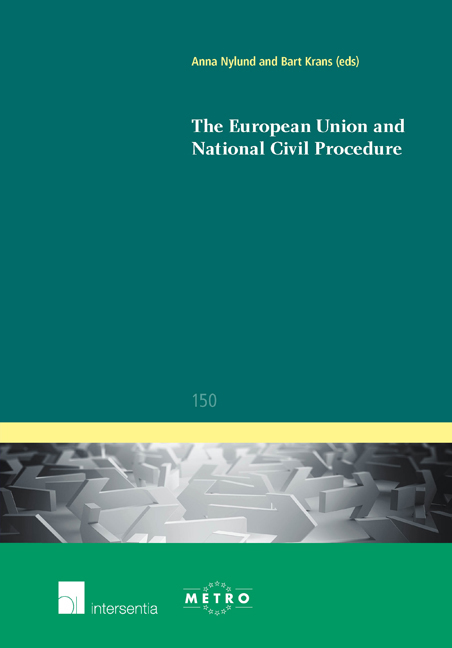Book contents
- Frontmatter
- Contents
- About the Authors
- List of Abbreviations
- The European Union and National Civil Procedure – A Rocky Road or a Smooth Process?
- Some European Challenges for Belgian Civil Procedure
- Danish Civil Procedure and the Internal Market: Impact and Challenges of Sectoral Harmonisation
- European Influences upon English Civil Justice: Tempests or Gentle Breezes?
- European Union and National Civil Procedure: The French Paradox
- The European Union and Civil Procedure from a German Perspective
- Interaction between European Law and Hungarian Civil Procedure Law
- The Impact of EU Law on Dutch Civil Procedure Law
- Norway: An Insider Outside – or an Outsider Inside – European Civil Justice
- Polish Civil Proceedings: How Much Europeanised?
- Slovenian Civil Procedure and the Transformative Power of the EU
- The Curious Incident of the Dog in the Night-Time: Europeanisation of Civil Procedure in Sweden
- Conclusions and Outlook
- Index
- Miscellaneous Endmatter
Slovenian Civil Procedure and the Transformative Power of the EU
Published online by Cambridge University Press: 19 December 2017
- Frontmatter
- Contents
- About the Authors
- List of Abbreviations
- The European Union and National Civil Procedure – A Rocky Road or a Smooth Process?
- Some European Challenges for Belgian Civil Procedure
- Danish Civil Procedure and the Internal Market: Impact and Challenges of Sectoral Harmonisation
- European Influences upon English Civil Justice: Tempests or Gentle Breezes?
- European Union and National Civil Procedure: The French Paradox
- The European Union and Civil Procedure from a German Perspective
- Interaction between European Law and Hungarian Civil Procedure Law
- The Impact of EU Law on Dutch Civil Procedure Law
- Norway: An Insider Outside – or an Outsider Inside – European Civil Justice
- Polish Civil Proceedings: How Much Europeanised?
- Slovenian Civil Procedure and the Transformative Power of the EU
- The Curious Incident of the Dog in the Night-Time: Europeanisation of Civil Procedure in Sweden
- Conclusions and Outlook
- Index
- Miscellaneous Endmatter
Summary
Introduction
After the downfall of communist regimes in the early 1990s Slovenia embarked on the path towards a parliamentary democracy and rebuilding of its legal system. The early era of transition was particularly turbulent as it was linked also to calls for independence. Slovenia became an independent state in 1991, whereby a full international recognition followed in 1992. Slovenia joined the European Union in 2004. The transition of civil justice in Slovenia is a difficult and onerous process, which is far from over yet. There exists a great public dissatisfaction with the functioning of civil justice due to excessive duration of proceedings and backlogs in courts. This still seriously undermines the trust in the judiciary in public opinion. The ‘EU justice scoreboard ‘ shows that the situation in both respects is, as the EU Commission keeps pointing out, worrying. Nevertheless, at least there is a distinct positive trend as backlogs have been gradually decreasing, the disposition time shortened and the ‘clearance rate'is slightly more than 100 per cent, which means that the situation is stable.’
When Slovenia joined the EU, optimistic expectations arose that the increased contact with the EU law as well as increasing familiarity with the case law of the CJEU, its judicial methods and reasoning will substantially affect the national legal system and serve as a source of inspiration for a more fundamental legal reform. It was expected that the impact of EU law would go far beyond areas where this was formally required by EU law itself. In addition, it was aspired that the so called transformative power of EU (law) would also result in a fresh impetus for a transition of the judiciary as well and that working methods and judicial mentality of judges and overall legal culture in Slovenia would be gradually improved.
Since it is more than ten years after Slovenia's accession to the EU it is time to critically assess whether these expectations were perhaps too optimistic. European civil procedure is certainly rapidly expanding and developing on the European level, in particular (but not limited to) the cross-border procedural instruments in the field of judicial co-operation in civil and commercial matters.
- Type
- Chapter
- Information
- The European Union and National Civil Procedure , pp. 131 - 146Publisher: IntersentiaPrint publication year: 2016
- 1
- Cited by



